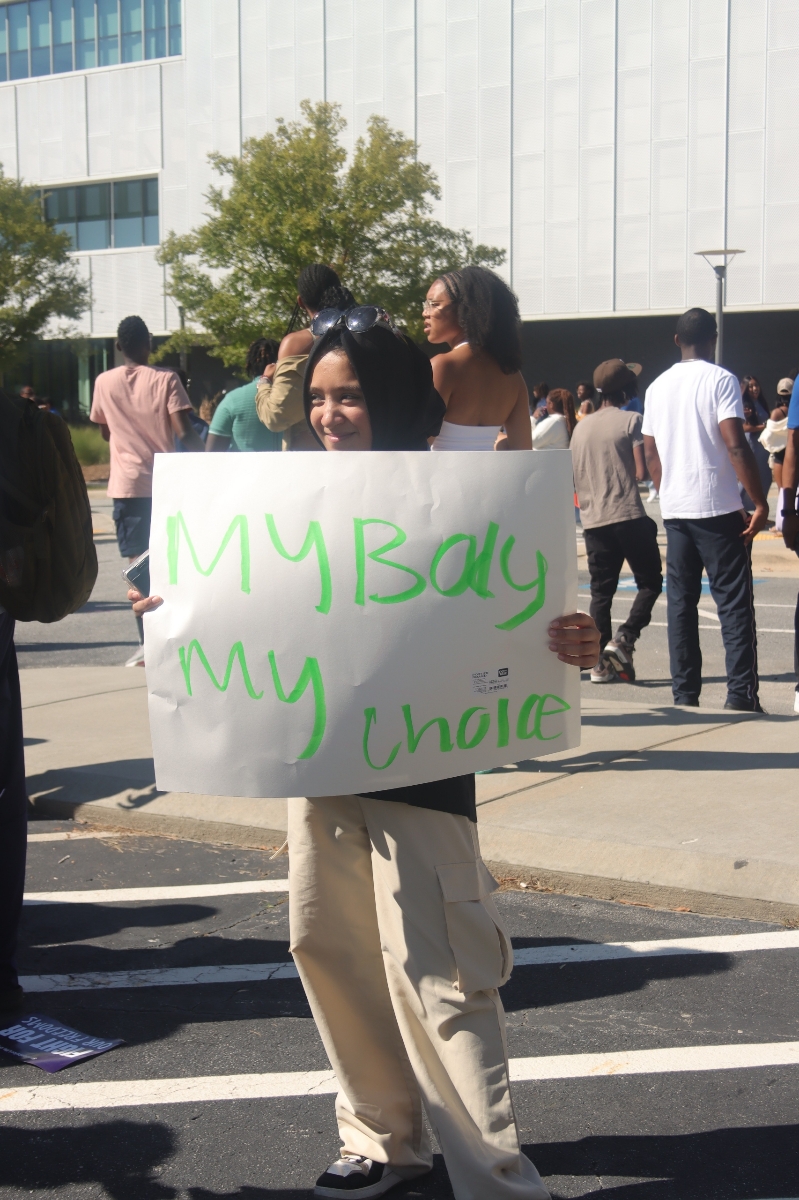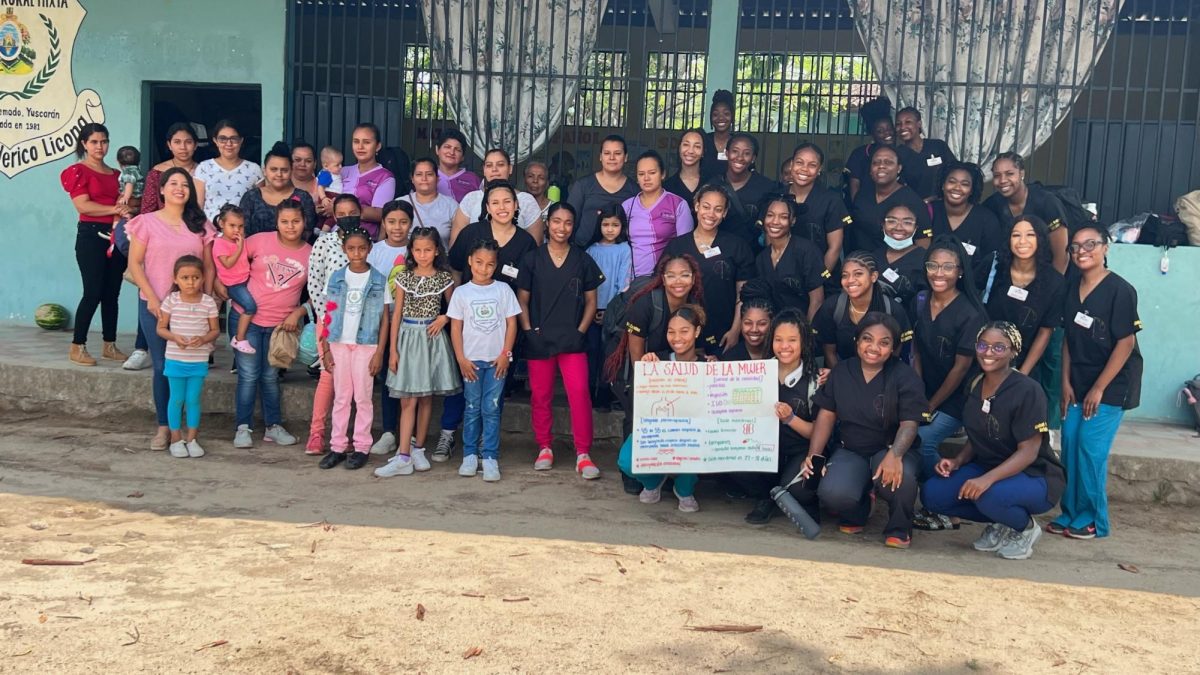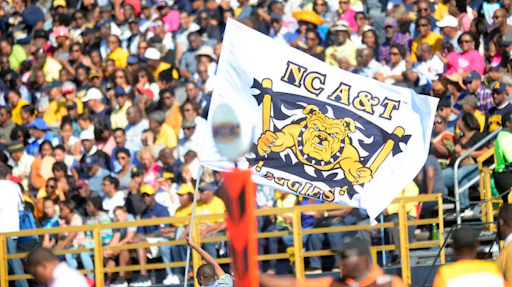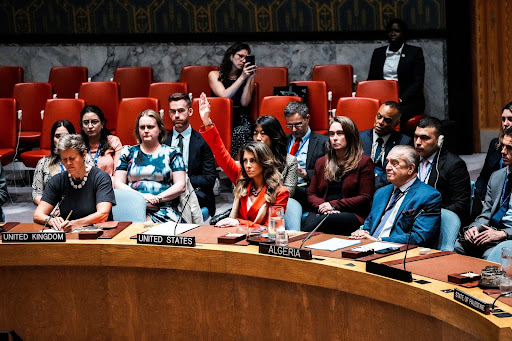As students piled into Corbett Sports Center on Sept. 15 to witness the Vice President of the United States, Kamala Harris speak, spokespersons with Students For Life of America protested outside the Aggie Dome against abortion rights.
Lydia Taylor, a student at Campbell University and President of Campbell Students for Life, a spokesperson for Students For Life of America and leader of the North Carolina Pro-Life force, was one of the students who led the pro-life protest.
According to the Center for Reproductive Rights, abortion laws in North Carolina have changed since the overturning of Roe v Wade. Abortions are now only legal in the first 12 weeks of pregnancy.
Harris briefly touched on abortion rights during her visit, emphasizing that she stands with women as it is an attack against their freedom and health care.
Taylor knew about Harris’s opinion on abortion, which was one of the reasons she came to A&T.
“We wanted to protest against her support of abortion until birth,” Taylor said. “We wanted to encourage students to ask her during the Q&A how she feels about Planned Parenthood targeting the black community and how she feels about Planned Parenthood covering up the killing of women.”
Many students felt these protesters shouldn’t have been on campus and decided to take matters into their own hands. From stealing their signs and bullhorns to even exchanging some words with the pro-life protestors.
Taylor, however, felt the students were harassing them.
“When students started to protest back, we started having peaceful conversations. Several students changed their minds on the abortion issue, and we were able to give out pregnancy resources,” Taylor said.
“Unfortunately, after Kamala spoke, we were surrounded by an aggressive mob of pro-choicers who stole our things, vandalized our signs and cursed us. It got aggressive, so police had to escort us to safety.”
Some students, like senior liberal studies student Sara Jado, felt uncomfortable with the pro-life protesters being there.
“There was no need for them to be on campus,” Jado said. “They were just gravitating to the student body, and by doing so, it made many people feel uncomfortable. Imagine being told you will go to hell for your right to choose.”
Jessica Newell, a student at Coastal Carolina, Live Action intern, which is a pro-life organization, and president of Illuminate CCU, was among those protesting, and she felt that her interaction with students was normal.
“We are used to what we experience on this campus,” Newell said. “We are used to having people fight back and scream at us when trying to have a genuine conversation. We came to this campus for a genuine conversation, and nobody was willing to do that.”
This incident is not the first time A&T students have felt they have no voice on campus regarding people, specifically conservative activists, who come on campus to persuade students to think one way.
Last spring, popular YouTuber John Doyle set up shop at A&T and tried to persuade students that America is not racist.
“Coming on a college campus, especially an HBCU, you are invading other students’ space with something that you know is controversial, and you know you’re going to face push-back,” Lailah Simmons, a junior graphic design student said.
“Most of us were angry and upset because he was saying we were mis-educated and uneducated on the issue.”
On Aug. 26, multiple gun incidents, with one happening on campus, resulted in new safety policies that included more police officers, closing campus early and more safety precautions.
“I was shocked, considering we had non-students, locals, who came on campus and started a shoot-out. And now, police have started asking students for their Aggie Ones and harassing skaters, telling them they can’t skate,” Simmons said.
“But we have these non-students coming on campus during an extremely important event, protesting an issue that greatly affects the community on our HBCU campus.”
Some students have had concerns since A&T’s campus is public, meaning anyone can come on campus. They feel as though the police pick and choose who to address.
“The skaters on campus can’t even have an event without being stopped by police and then questioned if they are students here,” Jado said. “Conservative activists get to walk freely on campus while students get questioned every day.”
Taylor confirmed that she called the school and campus safety beforehand to ask where she could protest during the event.
“While I was saddened by how things ended at the protest, we did take all the precautions beforehand,” Taylor said. “I called the school and your campus safety to let them know I was coming and asked where we could stand.”
Newell felt that students weren’t as open to listening because of the color of their skin and that it would’ve been easier to communicate with students if they had people of color protesting with them.
“We were supposed to have people from the Frederick Douglass Foundation, all people of color and anti-abortion, come with us and be the representation. But unfortunately, they couldn’t make it that morning,” Newell said.
This incident is part of a string of past situations that emphasize concerns about the UNC system and highlight how easily accessible the campuses are to non-students.







